Corporate Governance Issues in a Globalising World
VerifiedAdded on 2023/06/10
|15
|3686
|293
AI Summary
The article discusses the importance of corporate governance, factors that influence it, and mechanisms to implement it in a globalising world. It outlines the key arguments made in the article and discusses the relevance of various corporate governance theories such as legitimacy theory, social contract theory, stewardship theory, and stakeholder theory. The article also highlights the concept of social licence to operate and its legal implications for top listed companies.
Contribute Materials
Your contribution can guide someone’s learning journey. Share your
documents today.
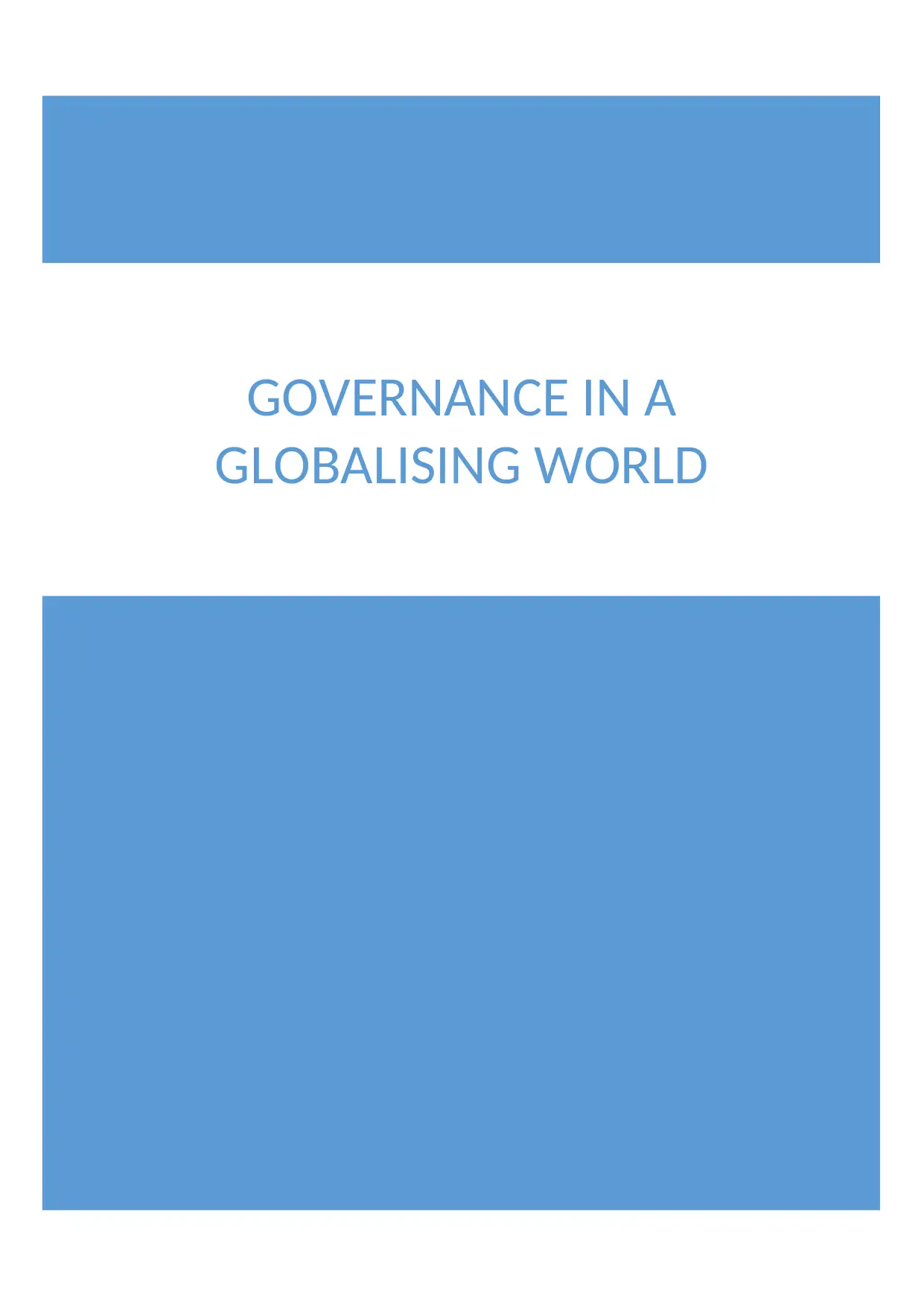
GOVERNANCE IN A
GLOBALISING WORLD
GLOBALISING WORLD
Secure Best Marks with AI Grader
Need help grading? Try our AI Grader for instant feedback on your assignments.
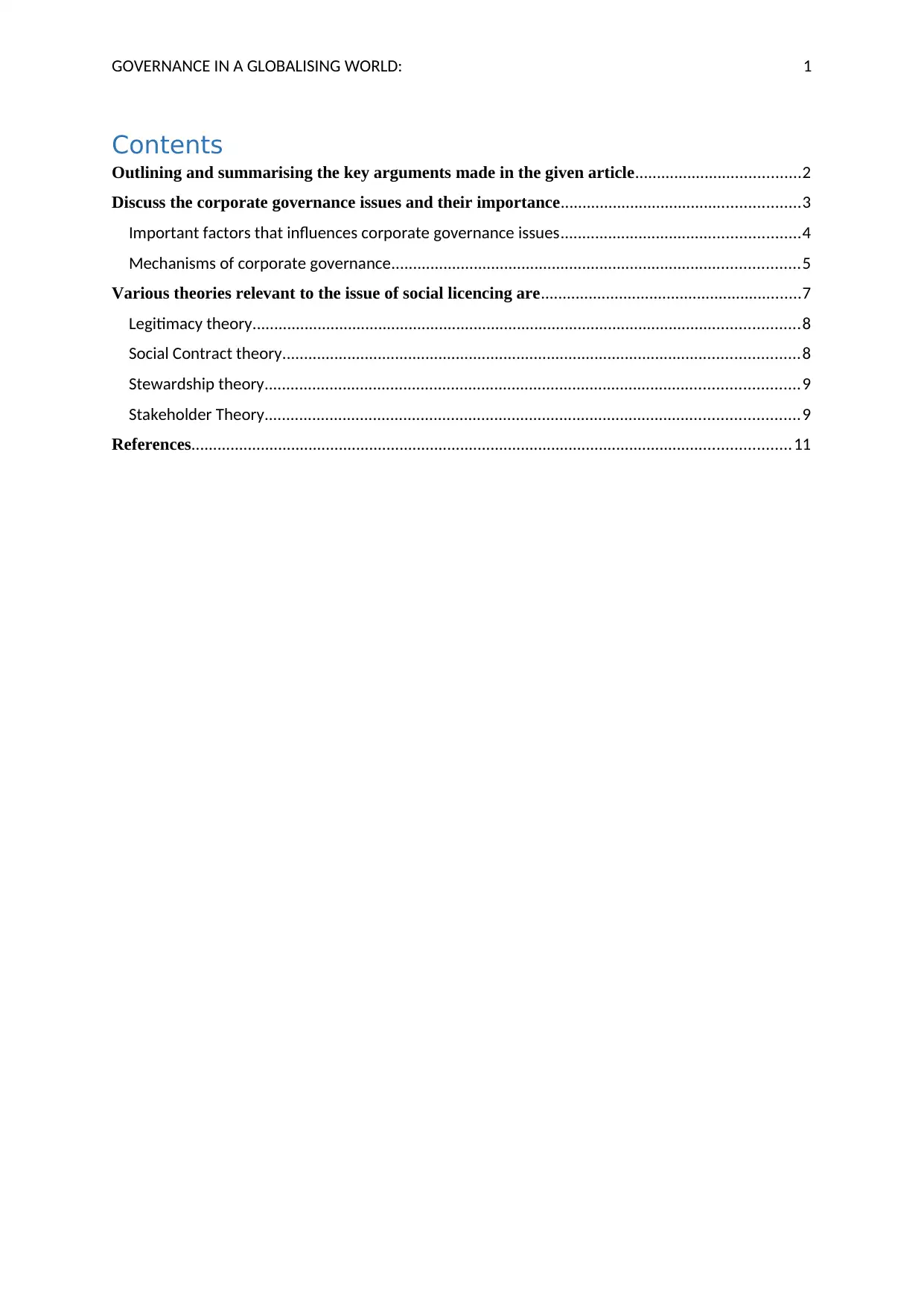
GOVERNANCE IN A GLOBALISING WORLD: 1
Contents
Outlining and summarising the key arguments made in the given article......................................2
Discuss the corporate governance issues and their importance.......................................................3
Important factors that influences corporate governance issues.......................................................4
Mechanisms of corporate governance..............................................................................................5
Various theories relevant to the issue of social licencing are............................................................7
Legitimacy theory..............................................................................................................................8
Social Contract theory.......................................................................................................................8
Stewardship theory...........................................................................................................................9
Stakeholder Theory...........................................................................................................................9
References..........................................................................................................................................11
Contents
Outlining and summarising the key arguments made in the given article......................................2
Discuss the corporate governance issues and their importance.......................................................3
Important factors that influences corporate governance issues.......................................................4
Mechanisms of corporate governance..............................................................................................5
Various theories relevant to the issue of social licencing are............................................................7
Legitimacy theory..............................................................................................................................8
Social Contract theory.......................................................................................................................8
Stewardship theory...........................................................................................................................9
Stakeholder Theory...........................................................................................................................9
References..........................................................................................................................................11
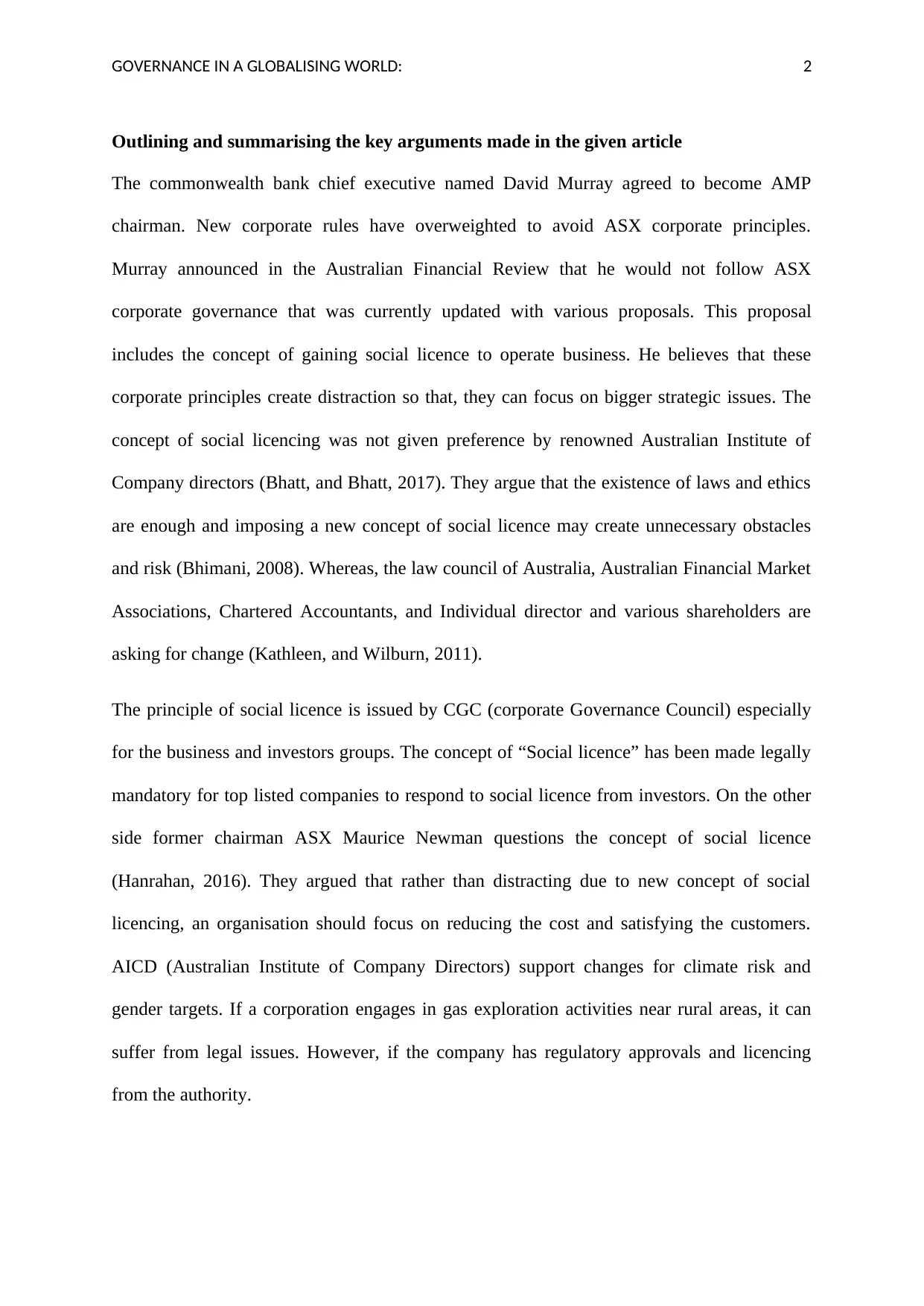
GOVERNANCE IN A GLOBALISING WORLD: 2
Outlining and summarising the key arguments made in the given article
The commonwealth bank chief executive named David Murray agreed to become AMP
chairman. New corporate rules have overweighted to avoid ASX corporate principles.
Murray announced in the Australian Financial Review that he would not follow ASX
corporate governance that was currently updated with various proposals. This proposal
includes the concept of gaining social licence to operate business. He believes that these
corporate principles create distraction so that, they can focus on bigger strategic issues. The
concept of social licencing was not given preference by renowned Australian Institute of
Company directors (Bhatt, and Bhatt, 2017). They argue that the existence of laws and ethics
are enough and imposing a new concept of social licence may create unnecessary obstacles
and risk (Bhimani, 2008). Whereas, the law council of Australia, Australian Financial Market
Associations, Chartered Accountants, and Individual director and various shareholders are
asking for change (Kathleen, and Wilburn, 2011).
The principle of social licence is issued by CGC (corporate Governance Council) especially
for the business and investors groups. The concept of “Social licence” has been made legally
mandatory for top listed companies to respond to social licence from investors. On the other
side former chairman ASX Maurice Newman questions the concept of social licence
(Hanrahan, 2016). They argued that rather than distracting due to new concept of social
licencing, an organisation should focus on reducing the cost and satisfying the customers.
AICD (Australian Institute of Company Directors) support changes for climate risk and
gender targets. If a corporation engages in gas exploration activities near rural areas, it can
suffer from legal issues. However, if the company has regulatory approvals and licencing
from the authority.
Outlining and summarising the key arguments made in the given article
The commonwealth bank chief executive named David Murray agreed to become AMP
chairman. New corporate rules have overweighted to avoid ASX corporate principles.
Murray announced in the Australian Financial Review that he would not follow ASX
corporate governance that was currently updated with various proposals. This proposal
includes the concept of gaining social licence to operate business. He believes that these
corporate principles create distraction so that, they can focus on bigger strategic issues. The
concept of social licencing was not given preference by renowned Australian Institute of
Company directors (Bhatt, and Bhatt, 2017). They argue that the existence of laws and ethics
are enough and imposing a new concept of social licence may create unnecessary obstacles
and risk (Bhimani, 2008). Whereas, the law council of Australia, Australian Financial Market
Associations, Chartered Accountants, and Individual director and various shareholders are
asking for change (Kathleen, and Wilburn, 2011).
The principle of social licence is issued by CGC (corporate Governance Council) especially
for the business and investors groups. The concept of “Social licence” has been made legally
mandatory for top listed companies to respond to social licence from investors. On the other
side former chairman ASX Maurice Newman questions the concept of social licence
(Hanrahan, 2016). They argued that rather than distracting due to new concept of social
licencing, an organisation should focus on reducing the cost and satisfying the customers.
AICD (Australian Institute of Company Directors) support changes for climate risk and
gender targets. If a corporation engages in gas exploration activities near rural areas, it can
suffer from legal issues. However, if the company has regulatory approvals and licencing
from the authority.
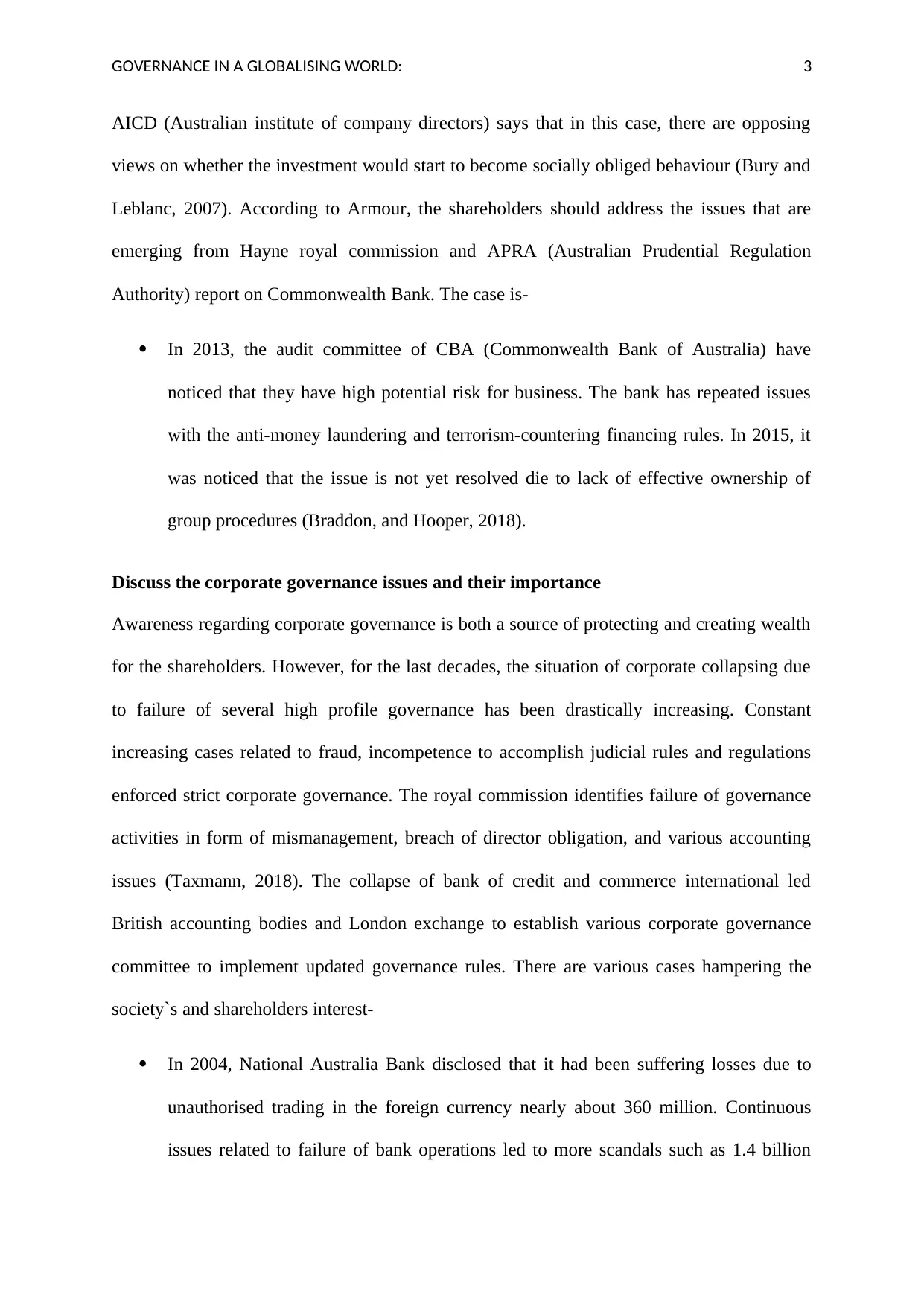
GOVERNANCE IN A GLOBALISING WORLD: 3
AICD (Australian institute of company directors) says that in this case, there are opposing
views on whether the investment would start to become socially obliged behaviour (Bury and
Leblanc, 2007). According to Armour, the shareholders should address the issues that are
emerging from Hayne royal commission and APRA (Australian Prudential Regulation
Authority) report on Commonwealth Bank. The case is-
In 2013, the audit committee of CBA (Commonwealth Bank of Australia) have
noticed that they have high potential risk for business. The bank has repeated issues
with the anti-money laundering and terrorism-countering financing rules. In 2015, it
was noticed that the issue is not yet resolved die to lack of effective ownership of
group procedures (Braddon, and Hooper, 2018).
Discuss the corporate governance issues and their importance
Awareness regarding corporate governance is both a source of protecting and creating wealth
for the shareholders. However, for the last decades, the situation of corporate collapsing due
to failure of several high profile governance has been drastically increasing. Constant
increasing cases related to fraud, incompetence to accomplish judicial rules and regulations
enforced strict corporate governance. The royal commission identifies failure of governance
activities in form of mismanagement, breach of director obligation, and various accounting
issues (Taxmann, 2018). The collapse of bank of credit and commerce international led
British accounting bodies and London exchange to establish various corporate governance
committee to implement updated governance rules. There are various cases hampering the
society`s and shareholders interest-
In 2004, National Australia Bank disclosed that it had been suffering losses due to
unauthorised trading in the foreign currency nearly about 360 million. Continuous
issues related to failure of bank operations led to more scandals such as 1.4 billion
AICD (Australian institute of company directors) says that in this case, there are opposing
views on whether the investment would start to become socially obliged behaviour (Bury and
Leblanc, 2007). According to Armour, the shareholders should address the issues that are
emerging from Hayne royal commission and APRA (Australian Prudential Regulation
Authority) report on Commonwealth Bank. The case is-
In 2013, the audit committee of CBA (Commonwealth Bank of Australia) have
noticed that they have high potential risk for business. The bank has repeated issues
with the anti-money laundering and terrorism-countering financing rules. In 2015, it
was noticed that the issue is not yet resolved die to lack of effective ownership of
group procedures (Braddon, and Hooper, 2018).
Discuss the corporate governance issues and their importance
Awareness regarding corporate governance is both a source of protecting and creating wealth
for the shareholders. However, for the last decades, the situation of corporate collapsing due
to failure of several high profile governance has been drastically increasing. Constant
increasing cases related to fraud, incompetence to accomplish judicial rules and regulations
enforced strict corporate governance. The royal commission identifies failure of governance
activities in form of mismanagement, breach of director obligation, and various accounting
issues (Taxmann, 2018). The collapse of bank of credit and commerce international led
British accounting bodies and London exchange to establish various corporate governance
committee to implement updated governance rules. There are various cases hampering the
society`s and shareholders interest-
In 2004, National Australia Bank disclosed that it had been suffering losses due to
unauthorised trading in the foreign currency nearly about 360 million. Continuous
issues related to failure of bank operations led to more scandals such as 1.4 billion
Secure Best Marks with AI Grader
Need help grading? Try our AI Grader for instant feedback on your assignments.
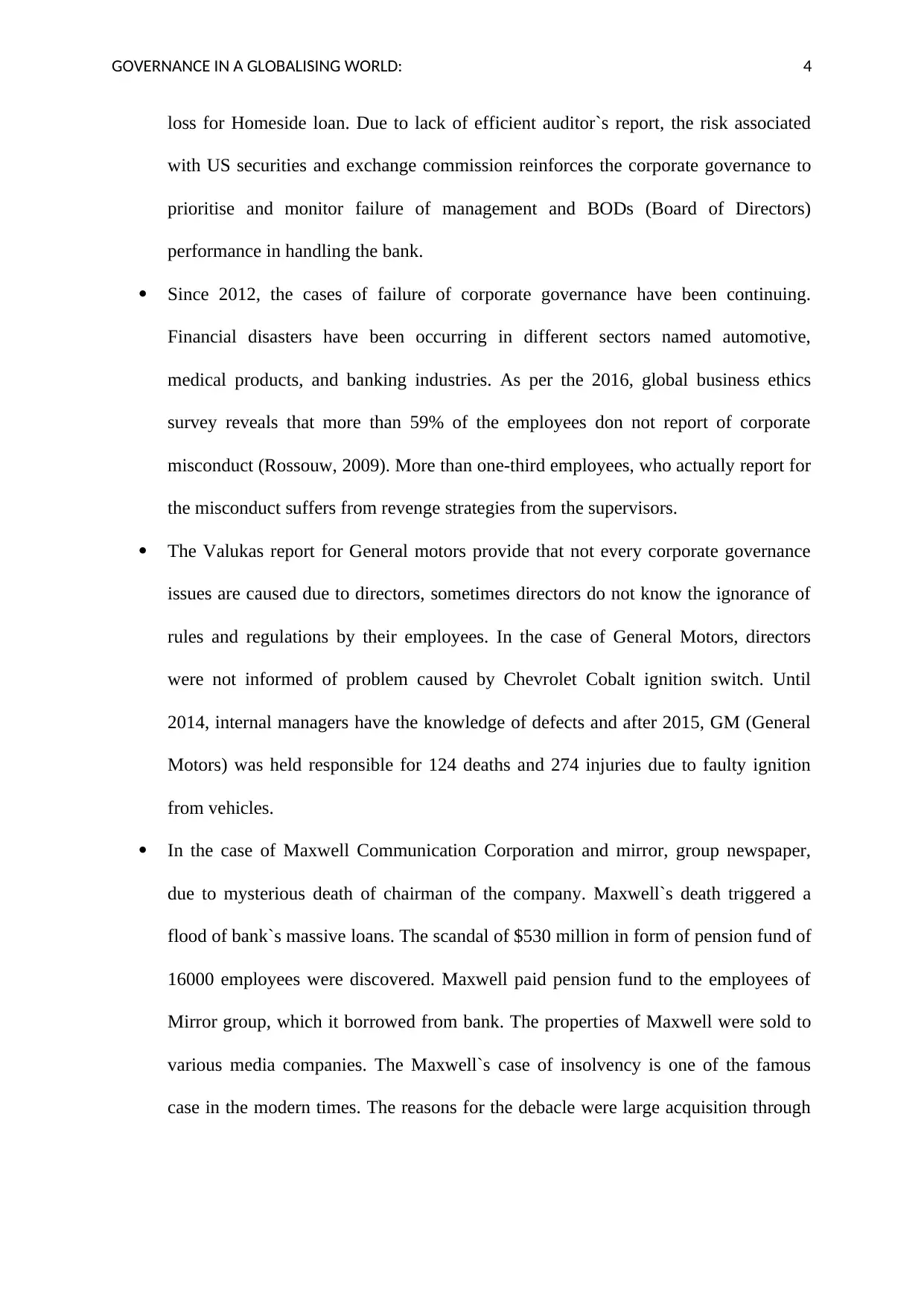
GOVERNANCE IN A GLOBALISING WORLD: 4
loss for Homeside loan. Due to lack of efficient auditor`s report, the risk associated
with US securities and exchange commission reinforces the corporate governance to
prioritise and monitor failure of management and BODs (Board of Directors)
performance in handling the bank.
Since 2012, the cases of failure of corporate governance have been continuing.
Financial disasters have been occurring in different sectors named automotive,
medical products, and banking industries. As per the 2016, global business ethics
survey reveals that more than 59% of the employees don not report of corporate
misconduct (Rossouw, 2009). More than one-third employees, who actually report for
the misconduct suffers from revenge strategies from the supervisors.
The Valukas report for General motors provide that not every corporate governance
issues are caused due to directors, sometimes directors do not know the ignorance of
rules and regulations by their employees. In the case of General Motors, directors
were not informed of problem caused by Chevrolet Cobalt ignition switch. Until
2014, internal managers have the knowledge of defects and after 2015, GM (General
Motors) was held responsible for 124 deaths and 274 injuries due to faulty ignition
from vehicles.
In the case of Maxwell Communication Corporation and mirror, group newspaper,
due to mysterious death of chairman of the company. Maxwell`s death triggered a
flood of bank`s massive loans. The scandal of $530 million in form of pension fund of
16000 employees were discovered. Maxwell paid pension fund to the employees of
Mirror group, which it borrowed from bank. The properties of Maxwell were sold to
various media companies. The Maxwell`s case of insolvency is one of the famous
case in the modern times. The reasons for the debacle were large acquisition through
loss for Homeside loan. Due to lack of efficient auditor`s report, the risk associated
with US securities and exchange commission reinforces the corporate governance to
prioritise and monitor failure of management and BODs (Board of Directors)
performance in handling the bank.
Since 2012, the cases of failure of corporate governance have been continuing.
Financial disasters have been occurring in different sectors named automotive,
medical products, and banking industries. As per the 2016, global business ethics
survey reveals that more than 59% of the employees don not report of corporate
misconduct (Rossouw, 2009). More than one-third employees, who actually report for
the misconduct suffers from revenge strategies from the supervisors.
The Valukas report for General motors provide that not every corporate governance
issues are caused due to directors, sometimes directors do not know the ignorance of
rules and regulations by their employees. In the case of General Motors, directors
were not informed of problem caused by Chevrolet Cobalt ignition switch. Until
2014, internal managers have the knowledge of defects and after 2015, GM (General
Motors) was held responsible for 124 deaths and 274 injuries due to faulty ignition
from vehicles.
In the case of Maxwell Communication Corporation and mirror, group newspaper,
due to mysterious death of chairman of the company. Maxwell`s death triggered a
flood of bank`s massive loans. The scandal of $530 million in form of pension fund of
16000 employees were discovered. Maxwell paid pension fund to the employees of
Mirror group, which it borrowed from bank. The properties of Maxwell were sold to
various media companies. The Maxwell`s case of insolvency is one of the famous
case in the modern times. The reasons for the debacle were large acquisition through
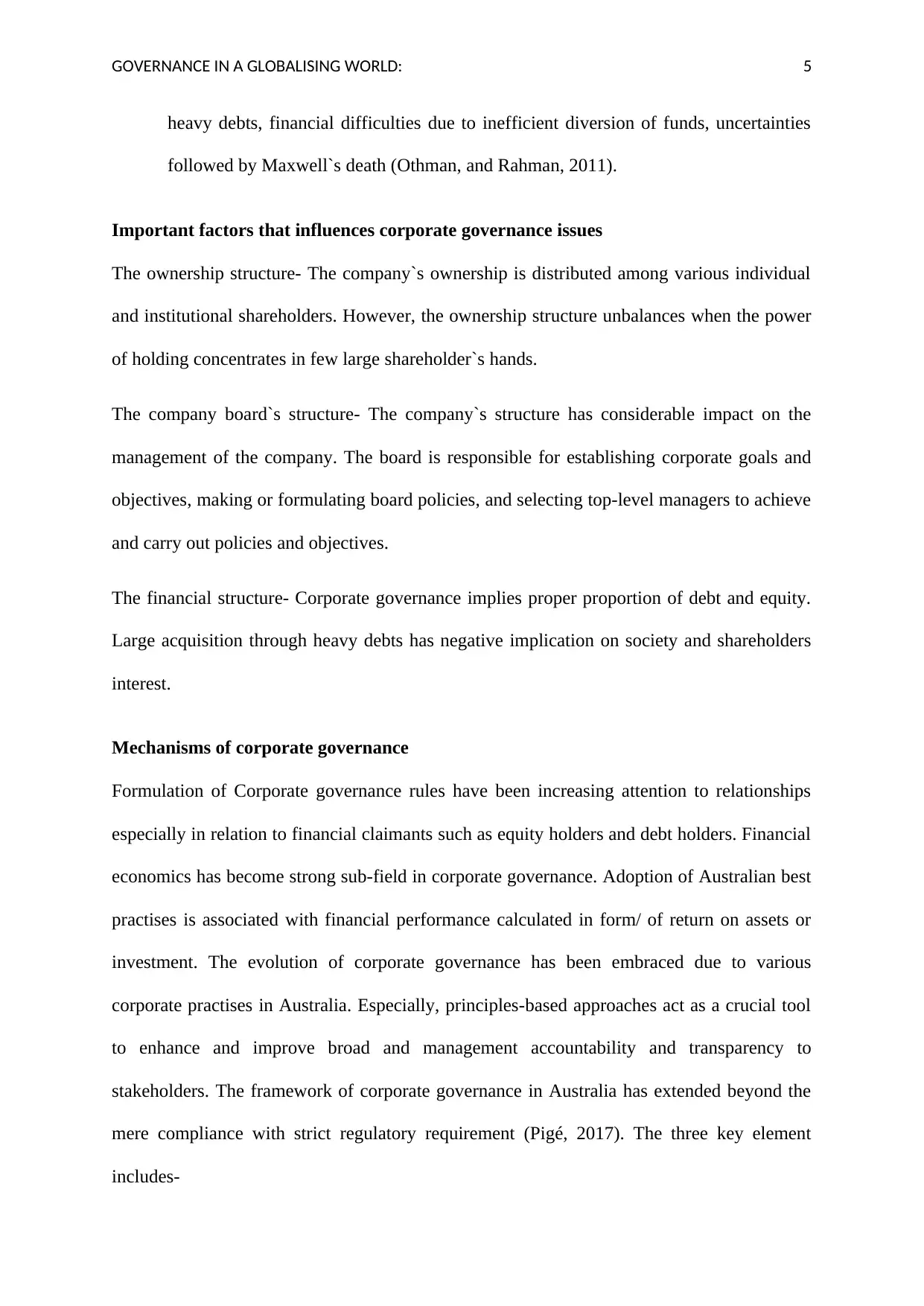
GOVERNANCE IN A GLOBALISING WORLD: 5
heavy debts, financial difficulties due to inefficient diversion of funds, uncertainties
followed by Maxwell`s death (Othman, and Rahman, 2011).
Important factors that influences corporate governance issues
The ownership structure- The company`s ownership is distributed among various individual
and institutional shareholders. However, the ownership structure unbalances when the power
of holding concentrates in few large shareholder`s hands.
The company board`s structure- The company`s structure has considerable impact on the
management of the company. The board is responsible for establishing corporate goals and
objectives, making or formulating board policies, and selecting top-level managers to achieve
and carry out policies and objectives.
The financial structure- Corporate governance implies proper proportion of debt and equity.
Large acquisition through heavy debts has negative implication on society and shareholders
interest.
Mechanisms of corporate governance
Formulation of Corporate governance rules have been increasing attention to relationships
especially in relation to financial claimants such as equity holders and debt holders. Financial
economics has become strong sub-field in corporate governance. Adoption of Australian best
practises is associated with financial performance calculated in form/ of return on assets or
investment. The evolution of corporate governance has been embraced due to various
corporate practises in Australia. Especially, principles-based approaches act as a crucial tool
to enhance and improve broad and management accountability and transparency to
stakeholders. The framework of corporate governance in Australia has extended beyond the
mere compliance with strict regulatory requirement (Pigé, 2017). The three key element
includes-
heavy debts, financial difficulties due to inefficient diversion of funds, uncertainties
followed by Maxwell`s death (Othman, and Rahman, 2011).
Important factors that influences corporate governance issues
The ownership structure- The company`s ownership is distributed among various individual
and institutional shareholders. However, the ownership structure unbalances when the power
of holding concentrates in few large shareholder`s hands.
The company board`s structure- The company`s structure has considerable impact on the
management of the company. The board is responsible for establishing corporate goals and
objectives, making or formulating board policies, and selecting top-level managers to achieve
and carry out policies and objectives.
The financial structure- Corporate governance implies proper proportion of debt and equity.
Large acquisition through heavy debts has negative implication on society and shareholders
interest.
Mechanisms of corporate governance
Formulation of Corporate governance rules have been increasing attention to relationships
especially in relation to financial claimants such as equity holders and debt holders. Financial
economics has become strong sub-field in corporate governance. Adoption of Australian best
practises is associated with financial performance calculated in form/ of return on assets or
investment. The evolution of corporate governance has been embraced due to various
corporate practises in Australia. Especially, principles-based approaches act as a crucial tool
to enhance and improve broad and management accountability and transparency to
stakeholders. The framework of corporate governance in Australia has extended beyond the
mere compliance with strict regulatory requirement (Pigé, 2017). The three key element
includes-
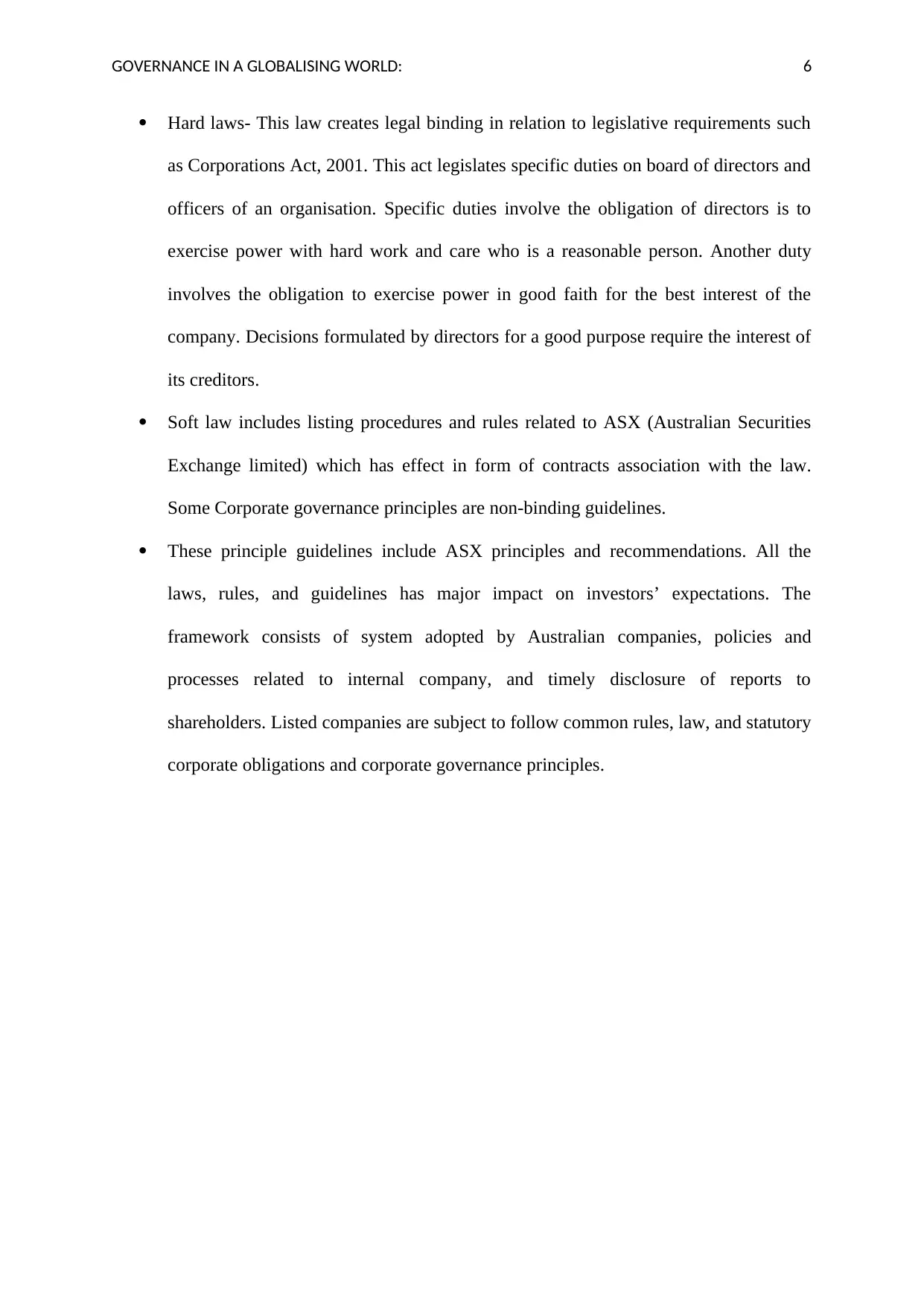
GOVERNANCE IN A GLOBALISING WORLD: 6
Hard laws- This law creates legal binding in relation to legislative requirements such
as Corporations Act, 2001. This act legislates specific duties on board of directors and
officers of an organisation. Specific duties involve the obligation of directors is to
exercise power with hard work and care who is a reasonable person. Another duty
involves the obligation to exercise power in good faith for the best interest of the
company. Decisions formulated by directors for a good purpose require the interest of
its creditors.
Soft law includes listing procedures and rules related to ASX (Australian Securities
Exchange limited) which has effect in form of contracts association with the law.
Some Corporate governance principles are non-binding guidelines.
These principle guidelines include ASX principles and recommendations. All the
laws, rules, and guidelines has major impact on investors’ expectations. The
framework consists of system adopted by Australian companies, policies and
processes related to internal company, and timely disclosure of reports to
shareholders. Listed companies are subject to follow common rules, law, and statutory
corporate obligations and corporate governance principles.
Hard laws- This law creates legal binding in relation to legislative requirements such
as Corporations Act, 2001. This act legislates specific duties on board of directors and
officers of an organisation. Specific duties involve the obligation of directors is to
exercise power with hard work and care who is a reasonable person. Another duty
involves the obligation to exercise power in good faith for the best interest of the
company. Decisions formulated by directors for a good purpose require the interest of
its creditors.
Soft law includes listing procedures and rules related to ASX (Australian Securities
Exchange limited) which has effect in form of contracts association with the law.
Some Corporate governance principles are non-binding guidelines.
These principle guidelines include ASX principles and recommendations. All the
laws, rules, and guidelines has major impact on investors’ expectations. The
framework consists of system adopted by Australian companies, policies and
processes related to internal company, and timely disclosure of reports to
shareholders. Listed companies are subject to follow common rules, law, and statutory
corporate obligations and corporate governance principles.
Paraphrase This Document
Need a fresh take? Get an instant paraphrase of this document with our AI Paraphraser
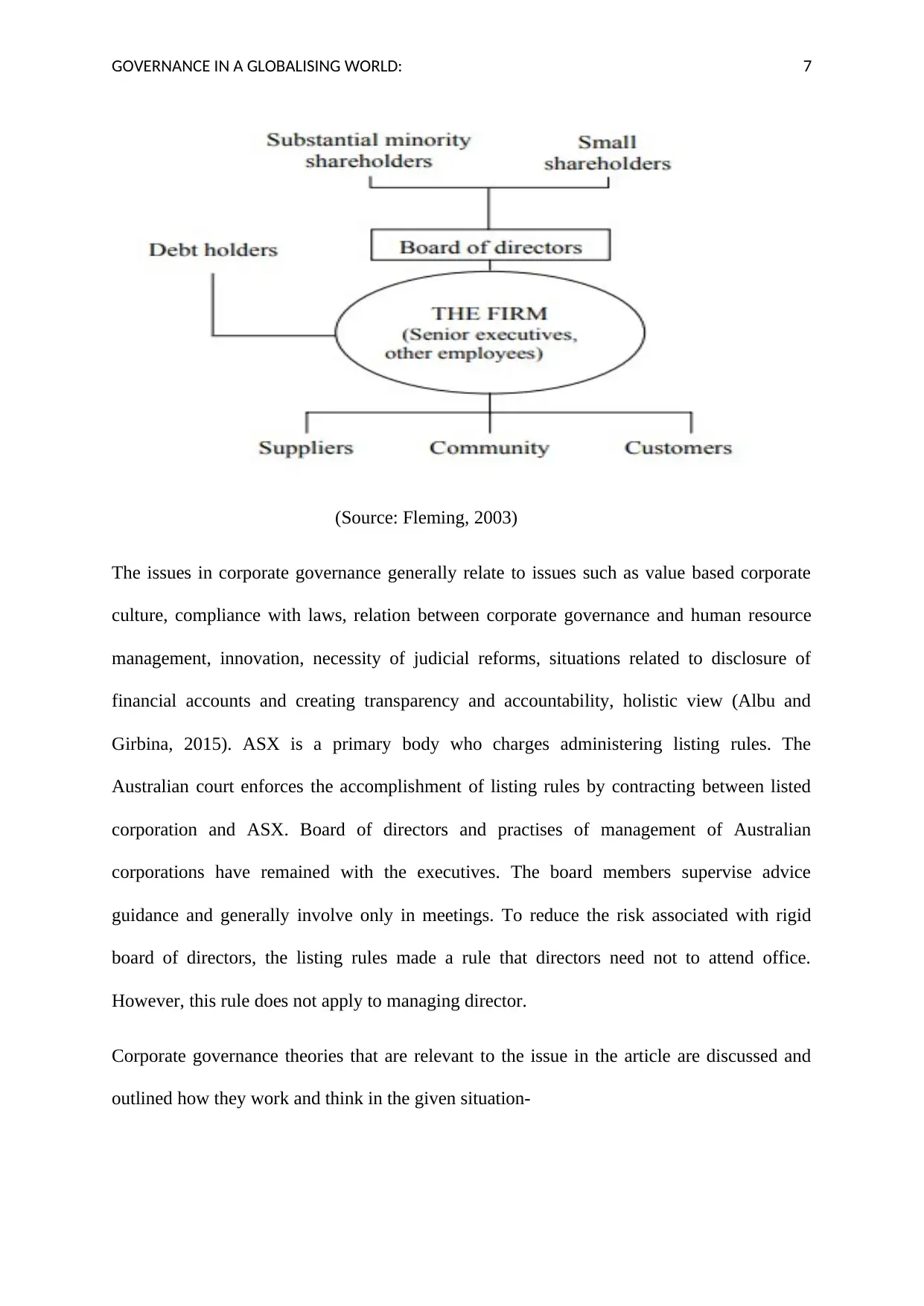
GOVERNANCE IN A GLOBALISING WORLD: 7
(Source: Fleming, 2003)
The issues in corporate governance generally relate to issues such as value based corporate
culture, compliance with laws, relation between corporate governance and human resource
management, innovation, necessity of judicial reforms, situations related to disclosure of
financial accounts and creating transparency and accountability, holistic view (Albu and
Girbina, 2015). ASX is a primary body who charges administering listing rules. The
Australian court enforces the accomplishment of listing rules by contracting between listed
corporation and ASX. Board of directors and practises of management of Australian
corporations have remained with the executives. The board members supervise advice
guidance and generally involve only in meetings. To reduce the risk associated with rigid
board of directors, the listing rules made a rule that directors need not to attend office.
However, this rule does not apply to managing director.
Corporate governance theories that are relevant to the issue in the article are discussed and
outlined how they work and think in the given situation-
(Source: Fleming, 2003)
The issues in corporate governance generally relate to issues such as value based corporate
culture, compliance with laws, relation between corporate governance and human resource
management, innovation, necessity of judicial reforms, situations related to disclosure of
financial accounts and creating transparency and accountability, holistic view (Albu and
Girbina, 2015). ASX is a primary body who charges administering listing rules. The
Australian court enforces the accomplishment of listing rules by contracting between listed
corporation and ASX. Board of directors and practises of management of Australian
corporations have remained with the executives. The board members supervise advice
guidance and generally involve only in meetings. To reduce the risk associated with rigid
board of directors, the listing rules made a rule that directors need not to attend office.
However, this rule does not apply to managing director.
Corporate governance theories that are relevant to the issue in the article are discussed and
outlined how they work and think in the given situation-
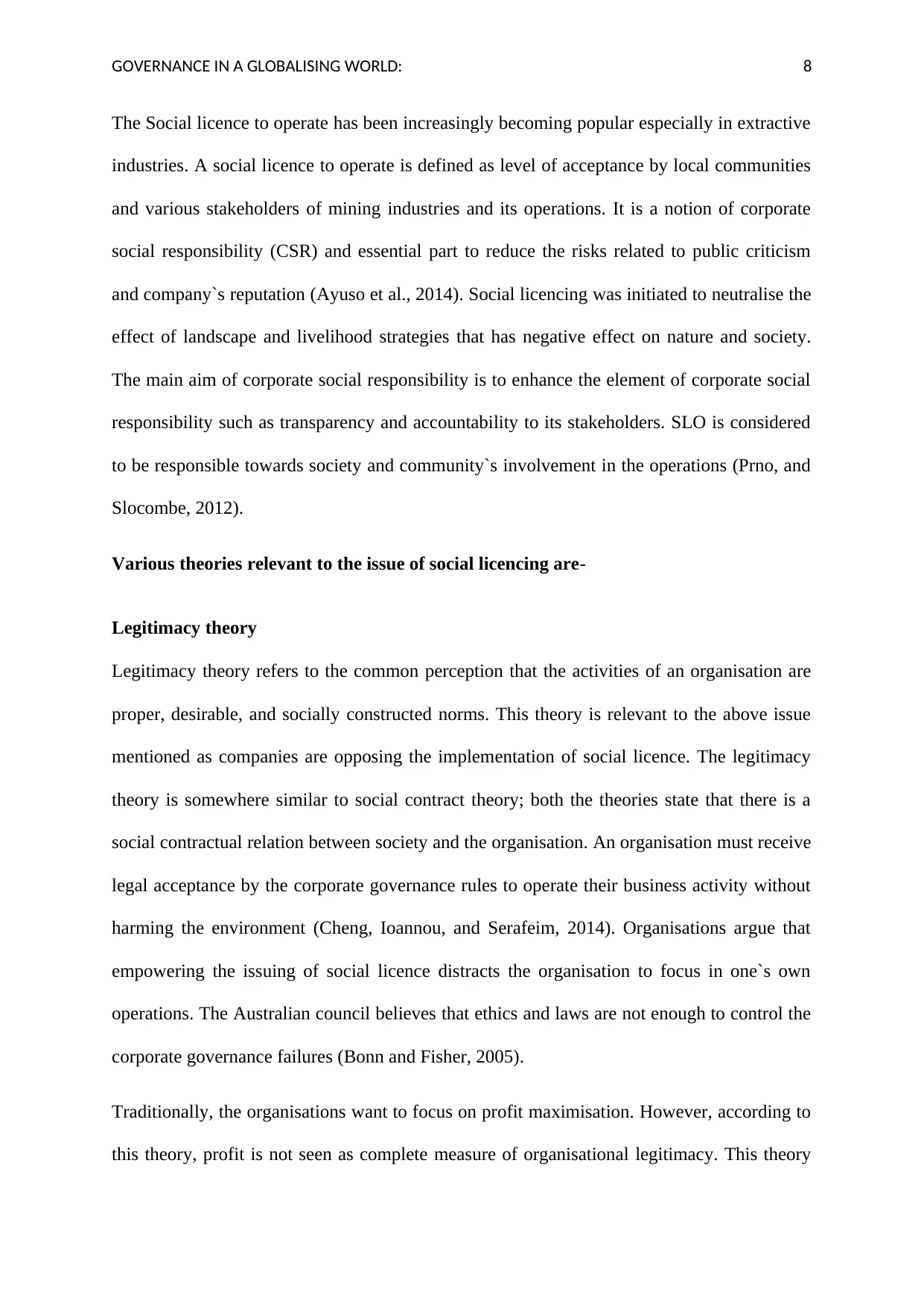
GOVERNANCE IN A GLOBALISING WORLD: 8
The Social licence to operate has been increasingly becoming popular especially in extractive
industries. A social licence to operate is defined as level of acceptance by local communities
and various stakeholders of mining industries and its operations. It is a notion of corporate
social responsibility (CSR) and essential part to reduce the risks related to public criticism
and company`s reputation (Ayuso et al., 2014). Social licencing was initiated to neutralise the
effect of landscape and livelihood strategies that has negative effect on nature and society.
The main aim of corporate social responsibility is to enhance the element of corporate social
responsibility such as transparency and accountability to its stakeholders. SLO is considered
to be responsible towards society and community`s involvement in the operations (Prno, and
Slocombe, 2012).
Various theories relevant to the issue of social licencing are-
Legitimacy theory
Legitimacy theory refers to the common perception that the activities of an organisation are
proper, desirable, and socially constructed norms. This theory is relevant to the above issue
mentioned as companies are opposing the implementation of social licence. The legitimacy
theory is somewhere similar to social contract theory; both the theories state that there is a
social contractual relation between society and the organisation. An organisation must receive
legal acceptance by the corporate governance rules to operate their business activity without
harming the environment (Cheng, Ioannou, and Serafeim, 2014). Organisations argue that
empowering the issuing of social licence distracts the organisation to focus in one`s own
operations. The Australian council believes that ethics and laws are not enough to control the
corporate governance failures (Bonn and Fisher, 2005).
Traditionally, the organisations want to focus on profit maximisation. However, according to
this theory, profit is not seen as complete measure of organisational legitimacy. This theory
The Social licence to operate has been increasingly becoming popular especially in extractive
industries. A social licence to operate is defined as level of acceptance by local communities
and various stakeholders of mining industries and its operations. It is a notion of corporate
social responsibility (CSR) and essential part to reduce the risks related to public criticism
and company`s reputation (Ayuso et al., 2014). Social licencing was initiated to neutralise the
effect of landscape and livelihood strategies that has negative effect on nature and society.
The main aim of corporate social responsibility is to enhance the element of corporate social
responsibility such as transparency and accountability to its stakeholders. SLO is considered
to be responsible towards society and community`s involvement in the operations (Prno, and
Slocombe, 2012).
Various theories relevant to the issue of social licencing are-
Legitimacy theory
Legitimacy theory refers to the common perception that the activities of an organisation are
proper, desirable, and socially constructed norms. This theory is relevant to the above issue
mentioned as companies are opposing the implementation of social licence. The legitimacy
theory is somewhere similar to social contract theory; both the theories state that there is a
social contractual relation between society and the organisation. An organisation must receive
legal acceptance by the corporate governance rules to operate their business activity without
harming the environment (Cheng, Ioannou, and Serafeim, 2014). Organisations argue that
empowering the issuing of social licence distracts the organisation to focus in one`s own
operations. The Australian council believes that ethics and laws are not enough to control the
corporate governance failures (Bonn and Fisher, 2005).
Traditionally, the organisations want to focus on profit maximisation. However, according to
this theory, profit is not seen as complete measure of organisational legitimacy. This theory
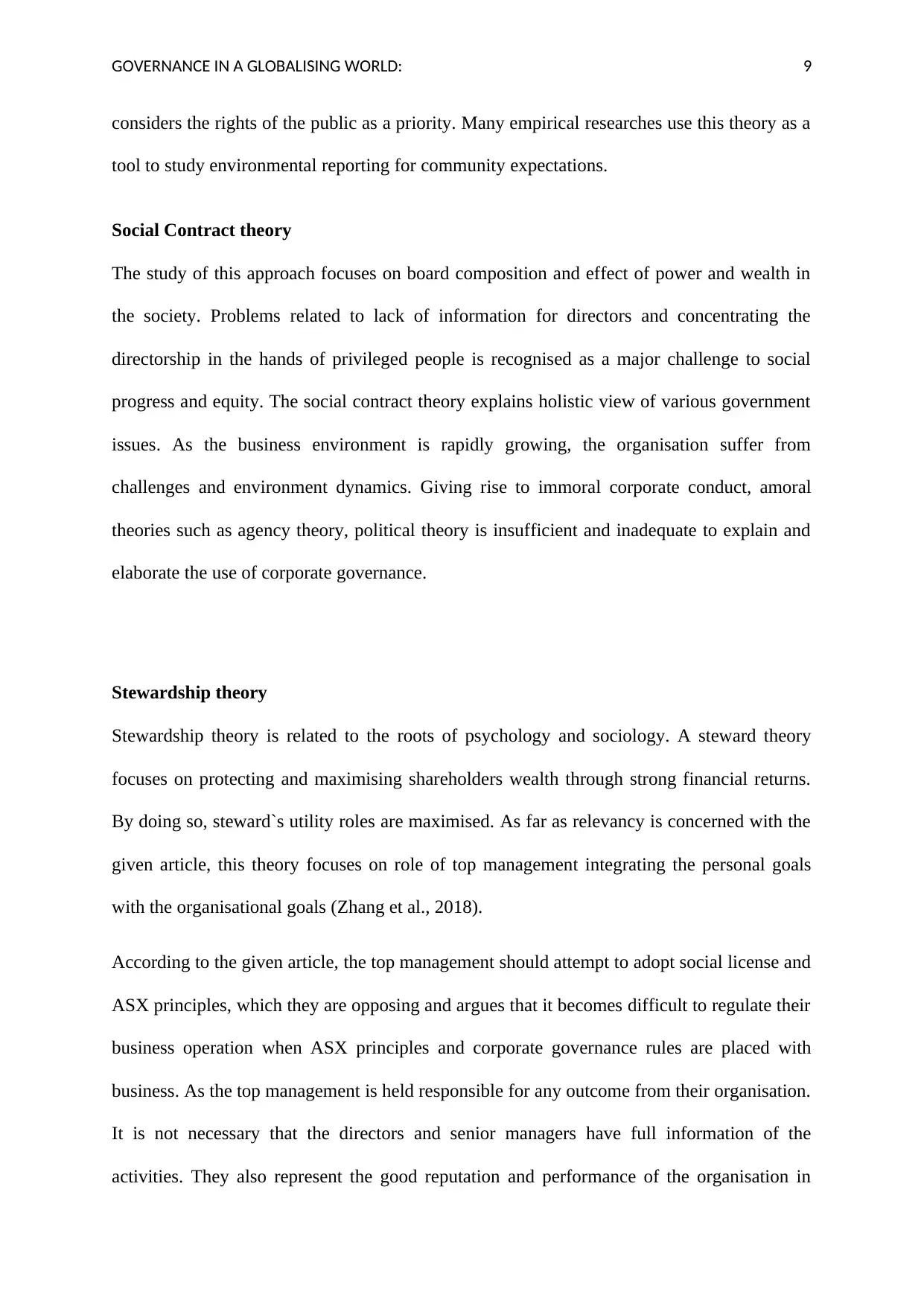
GOVERNANCE IN A GLOBALISING WORLD: 9
considers the rights of the public as a priority. Many empirical researches use this theory as a
tool to study environmental reporting for community expectations.
Social Contract theory
The study of this approach focuses on board composition and effect of power and wealth in
the society. Problems related to lack of information for directors and concentrating the
directorship in the hands of privileged people is recognised as a major challenge to social
progress and equity. The social contract theory explains holistic view of various government
issues. As the business environment is rapidly growing, the organisation suffer from
challenges and environment dynamics. Giving rise to immoral corporate conduct, amoral
theories such as agency theory, political theory is insufficient and inadequate to explain and
elaborate the use of corporate governance.
Stewardship theory
Stewardship theory is related to the roots of psychology and sociology. A steward theory
focuses on protecting and maximising shareholders wealth through strong financial returns.
By doing so, steward`s utility roles are maximised. As far as relevancy is concerned with the
given article, this theory focuses on role of top management integrating the personal goals
with the organisational goals (Zhang et al., 2018).
According to the given article, the top management should attempt to adopt social license and
ASX principles, which they are opposing and argues that it becomes difficult to regulate their
business operation when ASX principles and corporate governance rules are placed with
business. As the top management is held responsible for any outcome from their organisation.
It is not necessary that the directors and senior managers have full information of the
activities. They also represent the good reputation and performance of the organisation in
considers the rights of the public as a priority. Many empirical researches use this theory as a
tool to study environmental reporting for community expectations.
Social Contract theory
The study of this approach focuses on board composition and effect of power and wealth in
the society. Problems related to lack of information for directors and concentrating the
directorship in the hands of privileged people is recognised as a major challenge to social
progress and equity. The social contract theory explains holistic view of various government
issues. As the business environment is rapidly growing, the organisation suffer from
challenges and environment dynamics. Giving rise to immoral corporate conduct, amoral
theories such as agency theory, political theory is insufficient and inadequate to explain and
elaborate the use of corporate governance.
Stewardship theory
Stewardship theory is related to the roots of psychology and sociology. A steward theory
focuses on protecting and maximising shareholders wealth through strong financial returns.
By doing so, steward`s utility roles are maximised. As far as relevancy is concerned with the
given article, this theory focuses on role of top management integrating the personal goals
with the organisational goals (Zhang et al., 2018).
According to the given article, the top management should attempt to adopt social license and
ASX principles, which they are opposing and argues that it becomes difficult to regulate their
business operation when ASX principles and corporate governance rules are placed with
business. As the top management is held responsible for any outcome from their organisation.
It is not necessary that the directors and senior managers have full information of the
activities. They also represent the good reputation and performance of the organisation in
Secure Best Marks with AI Grader
Need help grading? Try our AI Grader for instant feedback on your assignments.
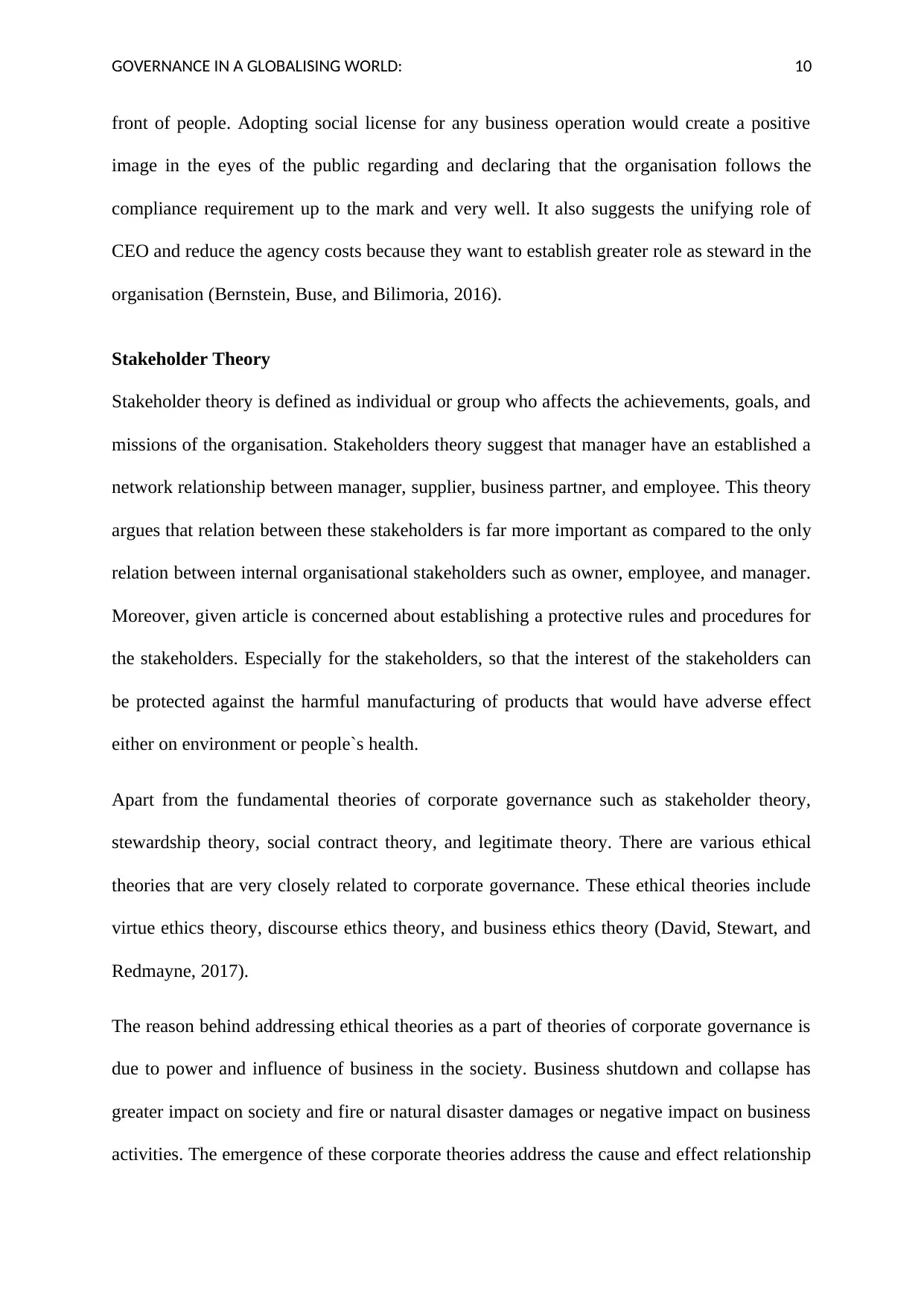
GOVERNANCE IN A GLOBALISING WORLD: 10
front of people. Adopting social license for any business operation would create a positive
image in the eyes of the public regarding and declaring that the organisation follows the
compliance requirement up to the mark and very well. It also suggests the unifying role of
CEO and reduce the agency costs because they want to establish greater role as steward in the
organisation (Bernstein, Buse, and Bilimoria, 2016).
Stakeholder Theory
Stakeholder theory is defined as individual or group who affects the achievements, goals, and
missions of the organisation. Stakeholders theory suggest that manager have an established a
network relationship between manager, supplier, business partner, and employee. This theory
argues that relation between these stakeholders is far more important as compared to the only
relation between internal organisational stakeholders such as owner, employee, and manager.
Moreover, given article is concerned about establishing a protective rules and procedures for
the stakeholders. Especially for the stakeholders, so that the interest of the stakeholders can
be protected against the harmful manufacturing of products that would have adverse effect
either on environment or people`s health.
Apart from the fundamental theories of corporate governance such as stakeholder theory,
stewardship theory, social contract theory, and legitimate theory. There are various ethical
theories that are very closely related to corporate governance. These ethical theories include
virtue ethics theory, discourse ethics theory, and business ethics theory (David, Stewart, and
Redmayne, 2017).
The reason behind addressing ethical theories as a part of theories of corporate governance is
due to power and influence of business in the society. Business shutdown and collapse has
greater impact on society and fire or natural disaster damages or negative impact on business
activities. The emergence of these corporate theories address the cause and effect relationship
front of people. Adopting social license for any business operation would create a positive
image in the eyes of the public regarding and declaring that the organisation follows the
compliance requirement up to the mark and very well. It also suggests the unifying role of
CEO and reduce the agency costs because they want to establish greater role as steward in the
organisation (Bernstein, Buse, and Bilimoria, 2016).
Stakeholder Theory
Stakeholder theory is defined as individual or group who affects the achievements, goals, and
missions of the organisation. Stakeholders theory suggest that manager have an established a
network relationship between manager, supplier, business partner, and employee. This theory
argues that relation between these stakeholders is far more important as compared to the only
relation between internal organisational stakeholders such as owner, employee, and manager.
Moreover, given article is concerned about establishing a protective rules and procedures for
the stakeholders. Especially for the stakeholders, so that the interest of the stakeholders can
be protected against the harmful manufacturing of products that would have adverse effect
either on environment or people`s health.
Apart from the fundamental theories of corporate governance such as stakeholder theory,
stewardship theory, social contract theory, and legitimate theory. There are various ethical
theories that are very closely related to corporate governance. These ethical theories include
virtue ethics theory, discourse ethics theory, and business ethics theory (David, Stewart, and
Redmayne, 2017).
The reason behind addressing ethical theories as a part of theories of corporate governance is
due to power and influence of business in the society. Business shutdown and collapse has
greater impact on society and fire or natural disaster damages or negative impact on business
activities. The emergence of these corporate theories address the cause and effect relationship
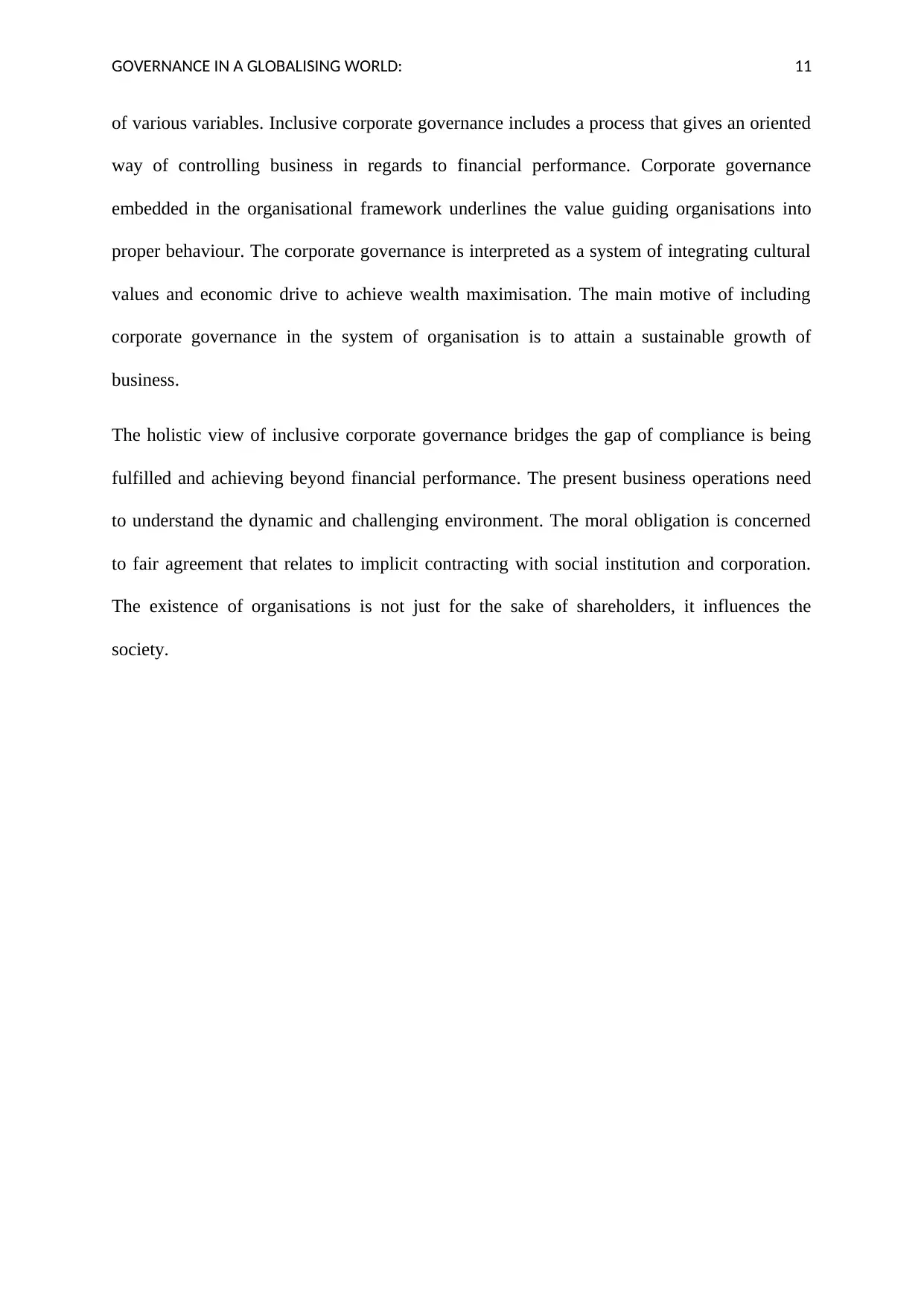
GOVERNANCE IN A GLOBALISING WORLD: 11
of various variables. Inclusive corporate governance includes a process that gives an oriented
way of controlling business in regards to financial performance. Corporate governance
embedded in the organisational framework underlines the value guiding organisations into
proper behaviour. The corporate governance is interpreted as a system of integrating cultural
values and economic drive to achieve wealth maximisation. The main motive of including
corporate governance in the system of organisation is to attain a sustainable growth of
business.
The holistic view of inclusive corporate governance bridges the gap of compliance is being
fulfilled and achieving beyond financial performance. The present business operations need
to understand the dynamic and challenging environment. The moral obligation is concerned
to fair agreement that relates to implicit contracting with social institution and corporation.
The existence of organisations is not just for the sake of shareholders, it influences the
society.
of various variables. Inclusive corporate governance includes a process that gives an oriented
way of controlling business in regards to financial performance. Corporate governance
embedded in the organisational framework underlines the value guiding organisations into
proper behaviour. The corporate governance is interpreted as a system of integrating cultural
values and economic drive to achieve wealth maximisation. The main motive of including
corporate governance in the system of organisation is to attain a sustainable growth of
business.
The holistic view of inclusive corporate governance bridges the gap of compliance is being
fulfilled and achieving beyond financial performance. The present business operations need
to understand the dynamic and challenging environment. The moral obligation is concerned
to fair agreement that relates to implicit contracting with social institution and corporation.
The existence of organisations is not just for the sake of shareholders, it influences the
society.
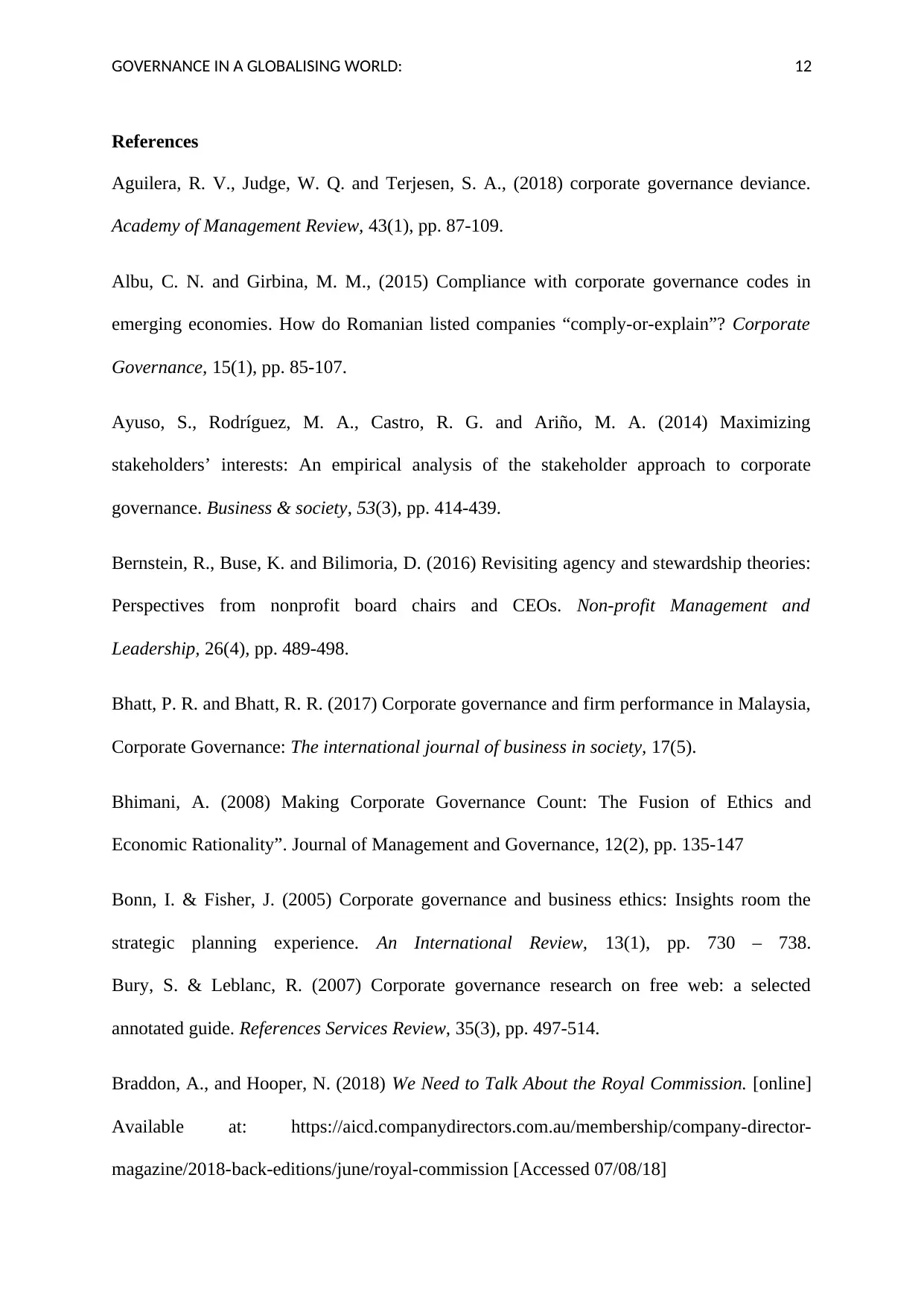
GOVERNANCE IN A GLOBALISING WORLD: 12
References
Aguilera, R. V., Judge, W. Q. and Terjesen, S. A., (2018) corporate governance deviance.
Academy of Management Review, 43(1), pp. 87-109.
Albu, C. N. and Girbina, M. M., (2015) Compliance with corporate governance codes in
emerging economies. How do Romanian listed companies “comply-or-explain”? Corporate
Governance, 15(1), pp. 85-107.
Ayuso, S., Rodríguez, M. A., Castro, R. G. and Ariño, M. A. (2014) Maximizing
stakeholders’ interests: An empirical analysis of the stakeholder approach to corporate
governance. Business & society, 53(3), pp. 414-439.
Bernstein, R., Buse, K. and Bilimoria, D. (2016) Revisiting agency and stewardship theories:
Perspectives from nonprofit board chairs and CEOs. Non-profit Management and
Leadership, 26(4), pp. 489-498.
Bhatt, P. R. and Bhatt, R. R. (2017) Corporate governance and firm performance in Malaysia,
Corporate Governance: The international journal of business in society, 17(5).
Bhimani, A. (2008) Making Corporate Governance Count: The Fusion of Ethics and
Economic Rationality”. Journal of Management and Governance, 12(2), pp. 135-147
Bonn, I. & Fisher, J. (2005) Corporate governance and business ethics: Insights room the
strategic planning experience. An International Review, 13(1), pp. 730 – 738.
Bury, S. & Leblanc, R. (2007) Corporate governance research on free web: a selected
annotated guide. References Services Review, 35(3), pp. 497-514.
Braddon, A., and Hooper, N. (2018) We Need to Talk About the Royal Commission. [online]
Available at: https://aicd.companydirectors.com.au/membership/company-director-
magazine/2018-back-editions/june/royal-commission [Accessed 07/08/18]
References
Aguilera, R. V., Judge, W. Q. and Terjesen, S. A., (2018) corporate governance deviance.
Academy of Management Review, 43(1), pp. 87-109.
Albu, C. N. and Girbina, M. M., (2015) Compliance with corporate governance codes in
emerging economies. How do Romanian listed companies “comply-or-explain”? Corporate
Governance, 15(1), pp. 85-107.
Ayuso, S., Rodríguez, M. A., Castro, R. G. and Ariño, M. A. (2014) Maximizing
stakeholders’ interests: An empirical analysis of the stakeholder approach to corporate
governance. Business & society, 53(3), pp. 414-439.
Bernstein, R., Buse, K. and Bilimoria, D. (2016) Revisiting agency and stewardship theories:
Perspectives from nonprofit board chairs and CEOs. Non-profit Management and
Leadership, 26(4), pp. 489-498.
Bhatt, P. R. and Bhatt, R. R. (2017) Corporate governance and firm performance in Malaysia,
Corporate Governance: The international journal of business in society, 17(5).
Bhimani, A. (2008) Making Corporate Governance Count: The Fusion of Ethics and
Economic Rationality”. Journal of Management and Governance, 12(2), pp. 135-147
Bonn, I. & Fisher, J. (2005) Corporate governance and business ethics: Insights room the
strategic planning experience. An International Review, 13(1), pp. 730 – 738.
Bury, S. & Leblanc, R. (2007) Corporate governance research on free web: a selected
annotated guide. References Services Review, 35(3), pp. 497-514.
Braddon, A., and Hooper, N. (2018) We Need to Talk About the Royal Commission. [online]
Available at: https://aicd.companydirectors.com.au/membership/company-director-
magazine/2018-back-editions/june/royal-commission [Accessed 07/08/18]
Paraphrase This Document
Need a fresh take? Get an instant paraphrase of this document with our AI Paraphraser
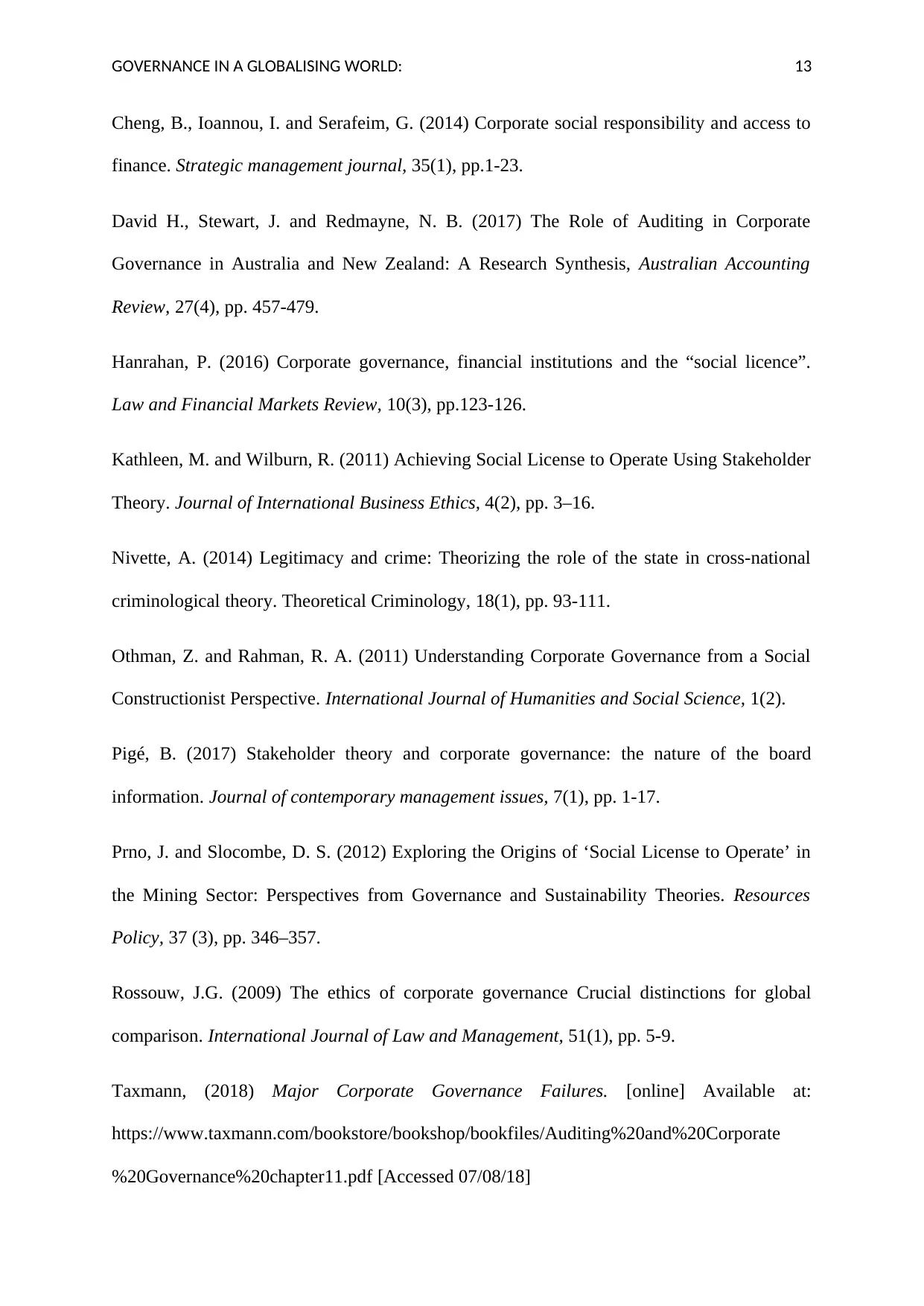
GOVERNANCE IN A GLOBALISING WORLD: 13
Cheng, B., Ioannou, I. and Serafeim, G. (2014) Corporate social responsibility and access to
finance. Strategic management journal, 35(1), pp.1-23.
David H., Stewart, J. and Redmayne, N. B. (2017) The Role of Auditing in Corporate
Governance in Australia and New Zealand: A Research Synthesis, Australian Accounting
Review, 27(4), pp. 457-479.
Hanrahan, P. (2016) Corporate governance, financial institutions and the “social licence”.
Law and Financial Markets Review, 10(3), pp.123-126.
Kathleen, M. and Wilburn, R. (2011) Achieving Social License to Operate Using Stakeholder
Theory. Journal of International Business Ethics, 4(2), pp. 3–16.
Nivette, A. (2014) Legitimacy and crime: Theorizing the role of the state in cross-national
criminological theory. Theoretical Criminology, 18(1), pp. 93-111.
Othman, Z. and Rahman, R. A. (2011) Understanding Corporate Governance from a Social
Constructionist Perspective. International Journal of Humanities and Social Science, 1(2).
Pigé, B. (2017) Stakeholder theory and corporate governance: the nature of the board
information. Journal of contemporary management issues, 7(1), pp. 1-17.
Prno, J. and Slocombe, D. S. (2012) Exploring the Origins of ‘Social License to Operate’ in
the Mining Sector: Perspectives from Governance and Sustainability Theories. Resources
Policy, 37 (3), pp. 346–357.
Rossouw, J.G. (2009) The ethics of corporate governance Crucial distinctions for global
comparison. International Journal of Law and Management, 51(1), pp. 5-9.
Taxmann, (2018) Major Corporate Governance Failures. [online] Available at:
https://www.taxmann.com/bookstore/bookshop/bookfiles/Auditing%20and%20Corporate
%20Governance%20chapter11.pdf [Accessed 07/08/18]
Cheng, B., Ioannou, I. and Serafeim, G. (2014) Corporate social responsibility and access to
finance. Strategic management journal, 35(1), pp.1-23.
David H., Stewart, J. and Redmayne, N. B. (2017) The Role of Auditing in Corporate
Governance in Australia and New Zealand: A Research Synthesis, Australian Accounting
Review, 27(4), pp. 457-479.
Hanrahan, P. (2016) Corporate governance, financial institutions and the “social licence”.
Law and Financial Markets Review, 10(3), pp.123-126.
Kathleen, M. and Wilburn, R. (2011) Achieving Social License to Operate Using Stakeholder
Theory. Journal of International Business Ethics, 4(2), pp. 3–16.
Nivette, A. (2014) Legitimacy and crime: Theorizing the role of the state in cross-national
criminological theory. Theoretical Criminology, 18(1), pp. 93-111.
Othman, Z. and Rahman, R. A. (2011) Understanding Corporate Governance from a Social
Constructionist Perspective. International Journal of Humanities and Social Science, 1(2).
Pigé, B. (2017) Stakeholder theory and corporate governance: the nature of the board
information. Journal of contemporary management issues, 7(1), pp. 1-17.
Prno, J. and Slocombe, D. S. (2012) Exploring the Origins of ‘Social License to Operate’ in
the Mining Sector: Perspectives from Governance and Sustainability Theories. Resources
Policy, 37 (3), pp. 346–357.
Rossouw, J.G. (2009) The ethics of corporate governance Crucial distinctions for global
comparison. International Journal of Law and Management, 51(1), pp. 5-9.
Taxmann, (2018) Major Corporate Governance Failures. [online] Available at:
https://www.taxmann.com/bookstore/bookshop/bookfiles/Auditing%20and%20Corporate
%20Governance%20chapter11.pdf [Accessed 07/08/18]
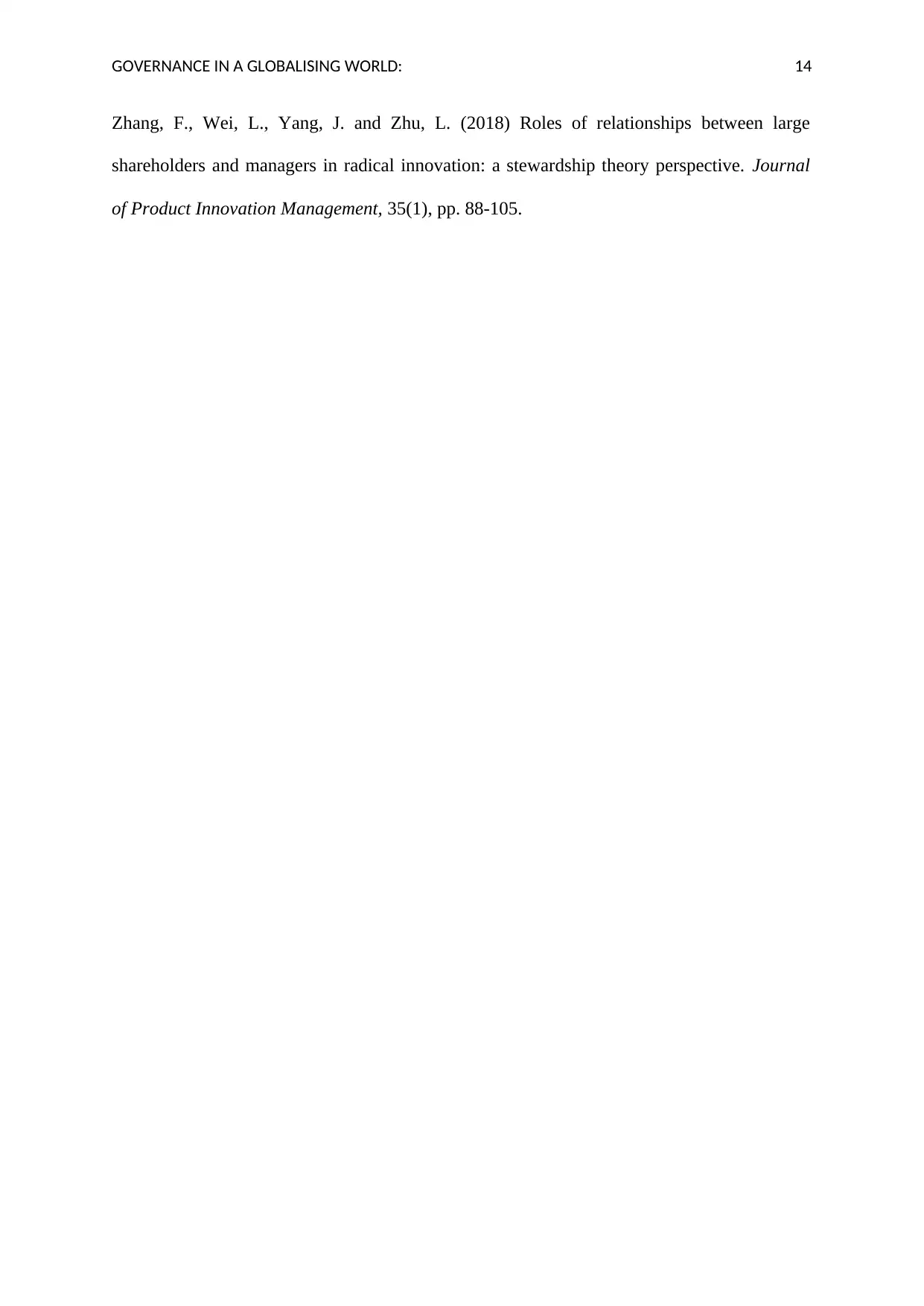
GOVERNANCE IN A GLOBALISING WORLD: 14
Zhang, F., Wei, L., Yang, J. and Zhu, L. (2018) Roles of relationships between large
shareholders and managers in radical innovation: a stewardship theory perspective. Journal
of Product Innovation Management, 35(1), pp. 88-105.
Zhang, F., Wei, L., Yang, J. and Zhu, L. (2018) Roles of relationships between large
shareholders and managers in radical innovation: a stewardship theory perspective. Journal
of Product Innovation Management, 35(1), pp. 88-105.
1 out of 15
Related Documents
Your All-in-One AI-Powered Toolkit for Academic Success.
+13062052269
info@desklib.com
Available 24*7 on WhatsApp / Email
![[object Object]](/_next/static/media/star-bottom.7253800d.svg)
Unlock your academic potential
© 2024 | Zucol Services PVT LTD | All rights reserved.



